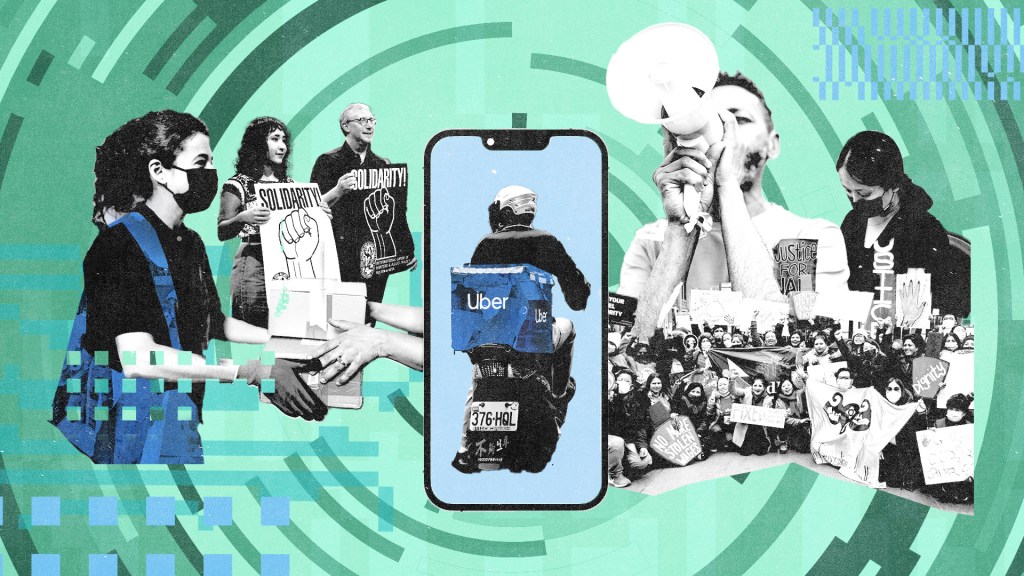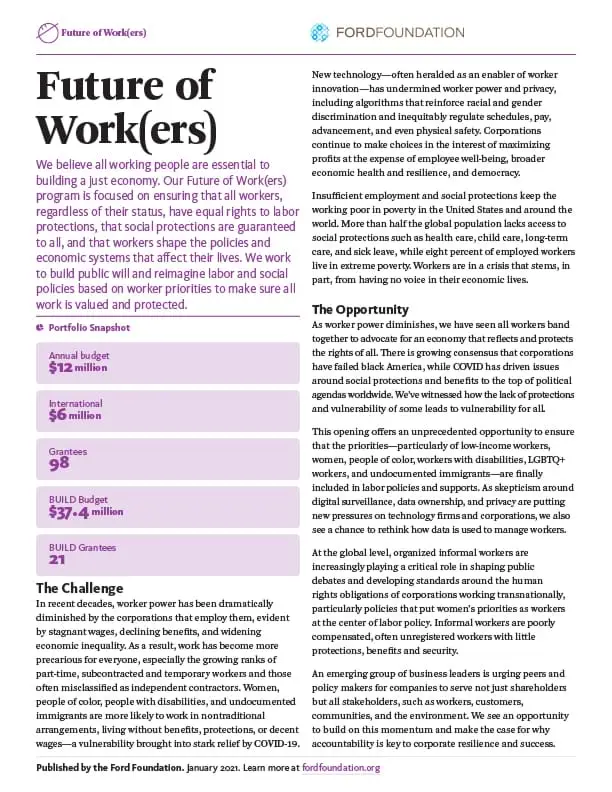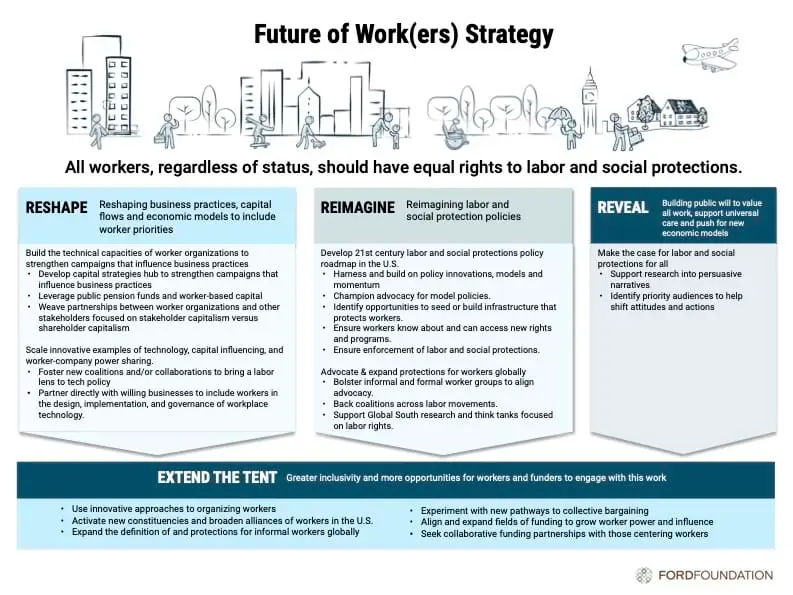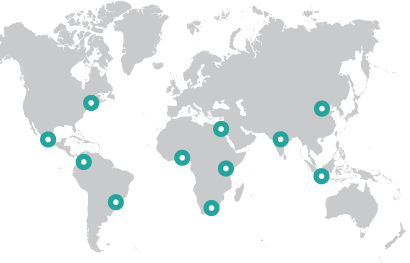U.S. and International Strategy

We believe all working people are essential to building a just economy. Our Future of Work(ers) program is focused on ensuring that all workers, regardless of their status, have equal rights to labor protections, that social protections are guaranteed to all, and that workers shape the policies and economic systems that affect their lives. We work to build public will and reimagine labor and social policies based on worker priorities to make sure all work is valued and protected.


The Challenge
In recent decades, worker power has been dramatically diminished by the corporations that employ them, evident by stagnant wages, declining benefits, and widening economic inequality. As a result, work has become more precarious for everyone, especially the growing ranks of part-time, subcontracted and temporary workers and those often misclassified as independent contractors. Women, people of color, people with disabilities, and undocumented immigrants are more likely to work in nontraditional arrangements, living without benefits, protections, or decent wages—a vulnerability brought into stark relief by COVID-19.
New technology—often heralded as an enabler of worker innovation—has undermined worker power and privacy, including algorithms that reinforce racial and gender discrimination and inequitably regulate schedules, pay, advancement, and even physical safety. Corporations continue to make choices in the interest of maximizing profits at the expense of employee well-being, broader economic health and resilience, and democracy.
Insufficient employment and social protections keep the working poor in poverty in the United States and around the world. More than half the global population lacks access to social protections such as health care, child care, long-term care, and sick leave, while eight percent of employed workers live in extreme poverty. Workers are in a crisis that stems, in part, from having no voice in their economic lives.
The Opportunity
As worker power diminishes, we have seen all workers band together to advocate for an economy that reflects and protects the rights of all. There is growing consensus that corporations have failed black America, while COVID has driven issues around social protections and benefits to the top of political agendas worldwide. We’ve witnessed how the lack of protections and vulnerability of some leads to vulnerability for all.
This opening offers an unprecedented opportunity to ensure that the priorities—particularly of low-income workers, women, people of color, workers with disabilities, LGBTQ+ workers, and undocumented immigrants—are finally included in labor policies and supports. As skepticism around digital surveillance, data ownership, and privacy are putting new pressures on technology firms and corporations, we also see a chance to rethink how data is used to manage workers.
At the global level, organized informal workers are increasingly playing a critical role in shaping public debates and developing standards around the human rights obligations of corporations working transnationally, particularly policies that put women’s priorities as workers at the center of labor policy. Informal workers are poorly compensated, often unregistered workers with little protections, benefits and security.
An emerging group of business leaders is urging peers and policy makers for companies to serve not just shareholders but all stakeholders, such as workers, customers, communities, and the environment. We see an opportunity to build on this momentum and make the case for why accountability is key to corporate resilience and success.
Our Aim and Approach
Our aim is to increase the voice and influence of all workers, particularly those with the least power historically, in reimagining labor and social policies. We support efforts to ensure that working people have a seat at decision-making tables to inform business practices, new technologies, and economic strategies that prioritize worker stability and security. We also build public will to value all work, support universal family care, and advance an equitable economy. We work to:
Build capacity and strengthen organizations
We foster the growth of organizations playing a vital role in enforcing labor laws and social protections and those finding new approaches to organize workers and new pathways to collective bargaining.
Chart a road map for 21st-century labor policy
We bring together actors across formal and more precarious forms of work in the United States, including advocates, organizers, policy groups, and academics, to collectively shape 21st-century labor policies at the federal level and in some key state and local governments. We invest in implementation and empowerment to ensure that vulnerable workers understand their rights and have the power to access new programs.
Collaboration and coordination on tech business models, policy, and governance
We cultivate partnerships to bring workers into tech design and implementation, support new coalitions to challenge unaccountable practices in the tech industry, and coordinate organizations looking to bring a worker lens to tech policy and governance.
Strengthen campaigns through capacity
We support the development of a hub to build the technical capacities of worker organizations to strengthen campaigns that influence business practices.
Advance communications strategies
We use effective messaging and communications that champion labor rights and social protections to influence key audiences including business leaders, policymakers, and other philanthropies.
Align global agendas
We support formal and informal worker groups to align agendas to better advocate for labor protections with multilateral institutions and investors.
Our Impact
Paths to ensure that workers, both in America and globally, shape the economy to better reflect their importance are needed now more than ever. Workers need to have the power to develop the next generation of policies around work, social protections, and the role of technology, and build an economy that works for everyone, not only the most powerful. We work toward five critical outcomes:
Improved worker rights policies
In the United States, new policies and regulations at the federal, state, and local level will increasingly protect worker rights and advance social protections.
Increasing worker influence on global institutions
Formal and informal worker groups will influence the agendas of key global institutions and investors to secure labor and social protections.
Supporting business practices that lead to a more just, resilient economy for all
Models for innovation in technology, worker-company power-sharing, and the role of capital will serve as examples of what’s possible for building a just future of work.
Changing narratives
Communications strategies will demonstrate messaging that is effective in championing labor rights and social protections for key audiences.
More robust funding
Increased and coordinated funding from new and existing donors will reinvigorate the field of worker rights and social protections.
Portfolio Snapshot
Annual Budget$12 million
INTERNational$6 million
Build Budget$37.4 million
Build grantees21
where we work

Number of grantees98
Grantee Snapshot

Reimagining Toys “R” Us with workers at the center
In 2017 Toys “R” Us declared bankruptcy, shuttering around 800 stores and firing 33,000 workers. When a new owner stepped in to restructure, leading to a few smaller, experimental stores opening in 2019, remaining workers took on a greater role, not just in producing the company’s profits but in deciding how those profits were invested. The leadership of Toys “R” Us saw worker participation in governance as a path to a better business—for workers, executives, shareholders, and consumers. United for Respect, a nonprofit that supports retail workers, helped create a “mirror board” of employees that has pushed the company to prioritize laid-off employees in rehires, rethink the layout of new stores, and institute a $15 minimum wage company-wide, including for part-time workers.